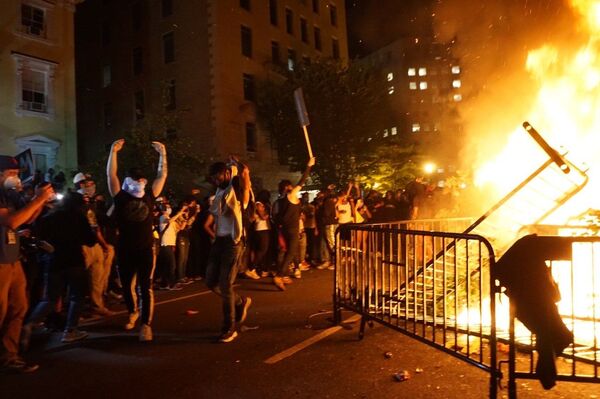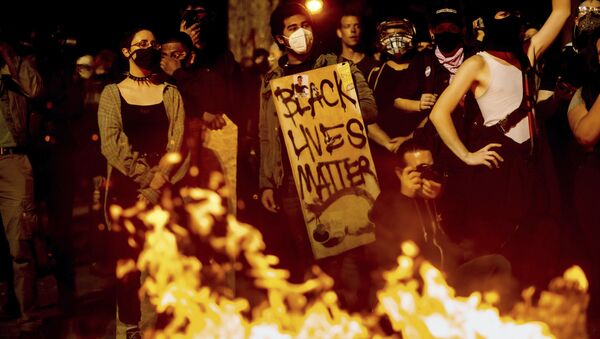Sputnik spoke to Shirley Jackson, a sociology and Black studies professor at Portland State University, to find out whether there is hope for an end to the violence.
Sputnik: What's the situation in the city now? What groups are behind the riots and destruction?
Shirley Jackson: I’m going to be a bit facetious here, but for those who are seeing this and some of the activities that have involved destruction of buildings and property, some of these individuals seem to have nothing better to do. Even with the passage of laws in the state of Oregon that had broad-based support and with what appears to be a loss of the presidency for Donald Trump it is not clear why people are protesting or to what end. As with other protests that have been taking place over the last several months, groups of people have just engaged in this behaviour without a clear agenda.
Sputnik: Now, as many businesses are vandalised, does it somehow impact the BLM movement's support in society? What do you make of the fact that most of the rioters are, essentially, white kids with left-wing political views who seem to have latched on to the BLM theme? Is there a risk that BLM may be steered to serve political agendas other than racial equality?
Shirley Jackson: I shared with the media this summer about how perception of the protests in Portland was becoming problematic. One problem is that the protests stopped being about BLM. Black people were not participating at the same rate once the protests become hijacked by individuals and groups who were not concerned about promoting the cause of the Black Lives Matter movement but were exhibiting anti-government sentiment and engaging in destruction of property. A related problem contributed, which was the presence of counter demonstrators who were not necessarily protesting against BLM inasmuch as they were protesting far-left activism that had become a consistent presence. Both groups were positioning themselves in ways that, once again, had little to do with BLM and more to do about perceptions of government supporters and anti-government activists. As a result, it became easy for protestors to latch on to a movement where their white privilege has gone unchecked and unacknowledged.

The movement that once was BLM turned into one that was unrecognisable to many and for others, it was still being associated with BLM. Due to the aforementioned, there has been an inevitable decline in support for BLM across the country. This was something that was bound to happen because protestors were not looking at how their actions would be used against them and for supporters of Trump or even those who were undecided. The perception of protestors being violent, angry, and out of control was a useful way to call for support for law and order.
Conservatives who see the problem as liberal cities filled with progressive whites and Blacks who are anti-government are ignoring the distinction between the different platforms and activities that took place during the summer at the height of the BLM protests and those that are continuing today. It is difficult for Black people in Portland to get others to understand that what is happening here is not BLM, because they constitute such a small percentage of the population in the city.
Sputnik: What kind of future do you expect for the movement in the event that Joe Biden takes office? Do you expect the protests to stop straight away? Do you think the new administration will initiate social and police reforms BLM considers acceptable?
Shirley Jackson: It is unlikely that the current protests will stop if Joe Biden takes office because there is no clear reason for the protests, no clear leader of the protests, and thus, no clear solution. I believe that Kamala Harris, as vice president, would likely revisit some of the positions she has taken regarding police reforms. This has not been addressed very much during the presidential and vice presidential campaign, but a dialogue on this topic will need to take place in order to move the BLM movement from mere words of support to action.
Sputnik: This week Oregon decriminalised several "hard" drugs. For years, it’s been argued that the "War on Drugs" has disproportionately targeted the Black community, as reflected in incarceration rates and accusations of harsher sentencing for Black Americans. Do you see decriminalisation as a positive step or do you think it encourages dangerous habits?
Shirley Jackson: Although there are areas in Oregon that are more conservative politically than others, it is quite progressive in general. This has made the decriminalisation of several drugs possible. It is ironic that the “War on Drugs” that was aimed at Black people in urban cities does not seem to apply in the same way it does when the population is predominately white. If anything, it shows how easily the characterisation and punishment of drug crimes change dramatically when applied to one segment of the population versus another. In many ways, the way in which race has been ignored in the decriminalisation of certain drugs in Oregon speaks to the state’s focus on personal freedom while ignoring the impact that drug laws have historically had on Black people.



